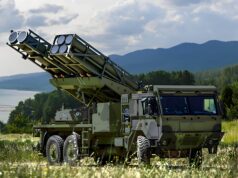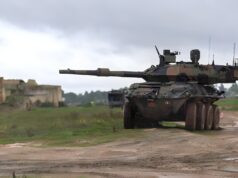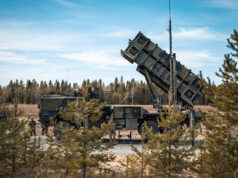The European Commission yesterday welcomed the decision adopted today by the European Council formally establishing Permanent Structured Cooperation (PESCO).
Also announced were plans presented by 25 EU Member States to work together on a first set of 17 collaborative defence projects.
Juncker has been calling for a stronger Europe on security and defence since his election campaign, saying in April 2014:
“I believe that we need to take more seriously the provisions of the existing Treaty that allow those European countries who want to do this to progressively build up a common European defence. I know this is not for everybody. But those countries that would like to go ahead should be encouraged to do so. Pooling defence capacities in Europe makes perfect economic sense.”
He added:
“In June I said it was time to wake up the Sleeping Beauty of the Lisbon Treaty: permanent structured cooperation. Six months later, it is happening. I welcome the steps taken today by Member States to lay the foundations of a European Defence Union. Europe cannot and should not outsource our security and defence.
The European Defence Fund that the European Commission proposed will complement these efforts and act as a further incentive for defence cooperation – including potential funding for some of the projects presented today.”
PESCO is designed as an instrument in the EU Treaty to enable willing Member States to pursue greater cooperation in defence and security.
Officials have earmarked 17 joint projects that will fall under the scope of the PESCO agreement. These include establishing a pan-European military training centre, improving capability development and even introducing common standards for military radio communication.
Germany is to take the lead on four projects: the creation of a pan-European medical unit, a logistics hub, a centre for training missions and an initiative to build up faster crisis response forces.
Building on the Commission’s White Paper on the Future of Europe, the reflection paper launching a public debate on how the EU at 27 might develop by 2025 in the area of defence, and his speech at the Defence and Security Conference in Prague, in his State of the Union address on 13 September 2017 President Juncker made the case for creating a fully-fledged European Defence Union by 2025.
The United Kingdom will not be involved.











Now the UK has decided to leave the EU, I would expect a EU defence force to evolve over time to replace the current national structures. Paid for by Germany and led by France of course.
The United states of Europe is now a foregone conclusion, the hope of a reformed EU with less centralised power is lost forever with the departure of the UK from the EU.
On that basis I happy to support brexit (even though I voted remain) I do not wish our armed forces to be integrated into a political EU military force.
I fear Europe is on a path that will lead to economic and political decline and it’s break up in the long term. Just think of Yugoslavia but on a much larger scale.
The problem with that Mike, the idea of the United states of Europe, is NATO and how it works, not just with the full 29 members – all of whom are sovereign states – but also the Partnership for Peace program of NATO of which Russia – yes, Russia, is a member.
There is also NORDEFCO which has a similar purpose, yet the members of NORDEFCO – Denmark, Finland, Iceland, Norway, and Sweden – are all sovereign states.
Defence co-operation in a world of stressed out budgets makes a lot of sense.
NATO is a collective of independent nations who pool their defence assets for mutual defence.
NATO is a not a political or economic union.
Who will control the EU defence force? The unelected EU commission? It will have its own budget.
Fundamental differences between NATO and proposed EU military forces.
From PESCO:
“Military capacities developed within PESCO remain in the hands of Member States that can also make them available in other contexts such as NATO or the UN. ”
Involvement with PESCO is voluntary, and so it seems is the depth of involvement. NATP on the other hand “strongly suggests” what member states should contribute, for instance Slovenia was “strongly recommended” to contribute to a joint Germany – Italy drone program when it joined. It did indeed contribute.
PESCO will eventually diminish NATO’s strength over time, leaving the US, UK, and possibly NORDEFCO as the core members. The realigned NATO will still want to link its activities with PESCO, as it grows, to ensure some joined up cooperation in the event of tension. I would assume current NATO members who will contribute to PESCO, will reduce their contribution to the Treaty, as the cost of giving both organizations equal weight, will be beyond most defense budgets? Just as the EU itself developed, the first fruits from PESCO will be the development of common fighting equipment, before concentrating on forming united forces?
However, PESCO will possibly not be as responsive in times of crisis as NATO, simply due to the sheer number of members of which, a majority need to agree on any action. Judging by the slow ponderous nature of how Brussels operates, any rapid decisions on military action will take an inordinately long time. Russia must be encouraged by all of these initiatives to defend the future of Europe, and the almost inevitable chaos that will ensue.
Surely NATO was just a means of formalising the defence of Europe by US arms, men and money. Junkers seems to think it’s a bad idea for Europe to ‘outsource its defence’ in this way, so it’s going to be hilarious.. sorry, interesting to see who is going to pay for it
I’m afraid to enlighten your writers – but, lead by Germany to defend Germany and paid for by any fool state that happen to remain in the EU post 2020.
Who are the two EU nations that are not going to take part?
Ireland is definitely one.
Ireland joined…. despite voting No in the Lisbon referendum.
Is there any scheme the French won’t come up with, in order for them to try and be the tail wagging the German dog?
Spot on Mac. But I doubt the German voters will put up with it.
Well Patrick I have gone away and some research and it appears Ireland has signed up.
Only Denmark and Malta have declined.
Noises coming out of Europe saying that if you must sign up to this, the Euro et al then you cannot be a member of the EU post 2025. I refer to Martin Schulz’s call for a United States of Europe by 2025.
Are the people of the republic of Ireland ready for a United States of Europe and all that entails?
Well Mike I’m surprised, short answer is no. Irish people adamantly support neutrality. Personally I think it’s a rubbish policy, but it’s a policy each Irish Government has upheld since the creation of the state.
If the EU start requesting the Irish military go on operations or start amalgamating Irish forces as with the German Dutch approach. Then we will see a very sharp rise in anti EU sentiment coming from Ireland.
I am happy to hear that Patrick, but I feel the ultra EU federalists will demand it going forward.
If that is the case then nations like Ireland will face some tough decisions in the future.
Patrick, if you were Irish you would know that the Irish state IS NOT neutral.
Take a gander at the Bunreacht, no neutrality referenced therein.
Ireland wasn’t neutral before the creation of the UK military alliance and it isn’t neutral after joining this alliance.
Isn’t this the same pact and defense union that Clegg and remainers said wouldn’t happen? They even mocked Farage over it when he warned them.
Wasn’t this one of the areas where we had a veto?
Nigel Farage, God bless him, is right on many things.
Glad the UK is not taking part in this.
NATO should always be our priority.
Nigel Farage was good for one thing only – getting his pension. History will not judge him kindly.
Crap. A hero for many, including me.
I know it will never happen but if we dont get a deal and they propose to do this EU Defence force now is a good time to say OK Europe you want your own force we the Brits will pull back to our own country and form an even closer bond with the US military (Nato)
Yep I’d go for that now.
Barry – exactly as I posted on another topic last week. Totally agree. Gloves have to come off now we are into the trade talks which will encompass far more than just trade .. after all its the bloody EU.
I support this 100%. It’s a win win for the UK. If they get their act together we’ll be free to look elsewhere for our defence commitments. I think our role in European defence should be in the N. Atlantic. If they don’t they won’t be able to blame us.
Oh don’t worry they will blame us, just as the French blamed us for their defeat in 1940.
@Mike – rubbish
It will be interesting to see if France/Germany try to use this to bully the UK defense companies by freezing them out of joint projects and forcing other EU countries to jointly fund them by default. Italy has already been complaining as Leonardo is split between Italy and the UK so may not benefit from joint projects as they need to be split across EU member states.
Well, Norway is a member of NORDEFCO (PESCO seems to be a similar idea) but got its frigates from Spain, and is getting its subs from Germany. It should be a means of co-operation, not exclusion, and for instance the UK and France are seeking closer co-operation, and that should continue.
There’s been a lot of hysteria whipped up by various strongly anti-EU newspapers, and it’s disappointing to see defence minded people falling for it hook line and sinker. A good read of the PESCO papers would be advised, for instance:
“The difference between PESCO and other forms of cooperation is the binding nature of the commitments undertaken by participating Member States. However, participation remains voluntary and decision-making will remain in the hands of participating Member States. ”
“decision-making will remain in the hands of participating Member States”
https://eeas.europa.eu/headquarters/headquarters-homepage_en/34226/Permanent%20Structured%20Cooperation%20(PESCO)%20-%20Factsheet
The point is PESCO is not the destination for the EU it’s a staging post for the desired destination, a EU controlled and funded military force.
The point will come in the medium term where the EU member states will be legally required to participate in an EU military force, as the progress of ever closer union is maintained.
Possibly Mike, but I don’t think it can go that far within the current Lisbon Treaty, PESCO is in the treaty, but not a totally EU controlled army / navy / air force.
But I look at it this way, I;m persoanlly not at all anti-EU or anti=France or Germany, but with Germany for instance currently on 1.22% of GDP compared with apparently the UK on 2.14% according to NATO, and France having slipped slightly to 1.79%, anything that encourages more spend from the EU laggards whether in NATO or not, is to be welcomed, and there are many of them:
https://www.nato.int/nato_static_fl2014/assets/pdf/pdf_2017_06/20170629_170629-pr2017-111-en.pdf
Some EU federalists consider the United States of Europe as the final destination, of course now the UK has decided to leave this task will become easier to achieve.
I see no need to duplicate to role of NATO within the EU, other than for political reasons?
The EU plans to spend ,€5bn on an annual basis on this project, no doubt this sum will grow over the years to come.
Aye, well so it should grow. But one useful thing for instance could be “a pan-European military training centre”, and there’s also “a logistics hub” – for smaller member states. People talk about defence budgets and imagine it all being spent front-line or on kit, but half is spent on these things and back office stuff – and perhaps proportionately more for smaller countries like Ireland – or Independent Scotland if it happens. Having a central training facility could be useful, and save money overall.
Yes, there are federalists, they were on the advance, then on the retreat, I daresay they’ll keep digging away. But the likes of Denmark for instance resists, and so do other EU states. I doubt it’ll happen, if ever, within 30 or 50 years, until the present and coming generation of old codgers like me forget all about previous wars.
If France is only sending 1.79% there nuclear deterrant and r&d must be coming out 9f different budgets. They current have a larger army and navy with a much stronger national defense industry so i cant see how it could be achieved in 1.79% of gdp.
The main benefits of this agreement will go of course to German and French industries forcing all members to use the same equipment.
Evening
Let them get on with it, as the penguin* said:
“Just smile and wave boys, smile and wave ?”
*Penguin from film “Madagascar”
Bob you are right. The EU will dictate to its members what projects and equipment they need to buy and in what quantities as a shared resource.
France and Germany will mop up.
Glad we are getting out of the EU it is all starting to look a bit worrying.
German dominance over Europe …again…this time through the back door, yet same result, increasing German influence, wealth and power over its neighbours.
This will be the end of NATO as we know it, maybe we should abandon the NATO concept and move towards a new treaty alliance of Anglosphere nations so UK, Canada, USA, Australia, New Zealand…Ireland if they want in , rather than joining EU military structure. I would see the Anglosphere nations quickly signing mutual defence treaties with Japan, South Korea and India.
As to where is TH? He has probably been told he is using up all the internet bandwidth in the Kremlin and he had to turn his laptop off. Putin was probably annoyed by not being able to watch his favourite internet streaming show.. Bear baiting in outer Mongolia.
Mr. Bell, add in Norway too as they’re a NATO ally and not in the European Union either. Possibly Denmark due to their disagreement of an EU armed forces.
I’m for NATO but I would agree 100% with a formal alliance between the Anglophile nations.
Having been a proud Brexit voter and anti EU campaigner, I am nonetheless sceptical if the Brexit voted for will go ahead. Just look at the shananagins under way in Parliament.
Powers that be are desperate to sabotage it despite a democratic vote.
We shall see.
If it gets sabotaged Nigel Farage will be back, stronger than before.
Daniele – don’t put your hopes on Nigel – he’s a busted flush. He is simply not a serious politician – look at his attendance record as an MEP. And now he’s a local radio presenter –
which is about his level (no disrespect to LBC)
Tim62 – OK we get it that you dislike Farage. Many do because for the EU lovers amongst us ‘He doth spake Herecy!’. And like Remainers (I don’t know if you are one) tend to do you make your dislike very personal rather than make an argument against his position. And by the way sarcasm is the lowest form of wit especially as I doubt you could even make teaboy at LBC…..
And ‘not a serious politician’? really? Farage has fought consistently and with some considerable passion for the UK’s independence for over 20 years, most of the time correctly, from the EU. When we were given a referendum the majority (some 17.4 Mn people) agreed with him. Had that referendum been a constituency vote he would have been part of a 150 seat majority. That makes him one VERY serious politician.
Farage has achieved a 20 year ambition through damned hard work. He is taking a sabbatical and enjoying himself on the radio and giving lectures. So what? And as it happens he attends as an MEP and leader of a group in the Euro-Parliament and his speeches are absolute gems given he is within the lion’s den he is attacking. The man is a total legend, he says what he believes and he is mightily proud of the UK so in that respect I can understand why you despise him …Its a damned shame other politicians aren’t half so proud or genuine.
Could not agree more Chris!
National Hero for me. Always will be.
Barry White.
just read your post in more detail.
spot on mate. 100% correct. If EU wants to do this then fine. We pull back and leave the EU 25 or is it 27??? To fend for themselves. Good luck with that. Meanwhile we will need to reinvigorate our own armed forces so much more independent and capable.
we will soon have our own EEZ to control again as well as our own free trade deals and commerce with the rest of the world to protect.
Saw this on Reuters and thought it interesting.
1949 – The United States, Canada and European countries set up the North Atlantic Treaty Organisation (NATO), a U.S.-led military alliance.
1950 – The European Defence Community is proposed as a European alternative to NATO to incorporate West Germany and create a European army, a joint budget and shared arms.
1954 – The French parliament rejects the European Army plan. Belgium, France, Luxembourg, the Netherlands and Britain form the Western European Union, a common defence group with a shared air force and joint command.
1993 – The EU’s Maastricht Treaty redefines European integration and introduces a Common Foreign and Security Policy as one of its goals, allowing European governments to take joint action in foreign policy.
1998 – Britain and France agree to common defence in the Saint-Malo Declaration, and London pledges to play a central role in the security and defence policy of the European Union.
2003 – The European Union launches its first independent military mission outside of Europe, Operation Artemis, with United Nations backing, to the Democratic Republic of the Congo.
2004 – The European Defence Agency is formed to help EU governments develop their military capabilities.
2007 – Rapid-reaction forces of about 1,500 soldiers, called EU Battlegroups, are formed under control of the Council of the European Union. However, they are never used.
2009 – The EU’s Lisbon Treaty strengthens the Common Foreign and Security Policy, creating an EU foreign policy chief.
2011 – France and Britain lead a campaign to oust Libyan leader Muammar Gaddafi but cannot impose no-fly zone without U.S. aircraft, munitions.
2017 – 25 EU governments launch a defence pact to integrate military planning, weapons development and operations that will rely on a 5 billion-euro ($5.83 billion) defence fund.
The thing is they’ll still need to pay for it all…
Anyone seen how much Germany alone has fallen behind with NATO payments?
We are talking 100 billion short in less than a decade.
Ummm, eh? Considering the UK pays about £200 million a year for NATO membership, by GDP that would make Germany’s NATO fees £270 million per year, for a grand total of £2.7 billion – and there’s no reason to think Germany hasn;t paid its membership fee every year.
On the other hand if you’re talking about % of GDP target of 2%, that’s supposed according to the 2014 Wales summit, to be achieved by 2024 – that’s still 6 years time.
So no, Germany has not “fallen behind with NATO payments”.
And no, we are not “talking 100 billion short in less than a decade”.
https://www.google.co.uk/amp/s/www.thesun.co.uk/news/5126756/britain-propped-up-europes-defence-after-other-eu-states-short-changed-nato-by-338billion/amp/
It’s actually 106 billion lol.
And in five years….not a decade.
Puts Germany’s ‘spend’ in perspective at the very least.
Sorry badly worded on my part…ment actual spending not direct payments…apologies.
But the intended point is the same and that is Europe doesn’t spend what it should .
Ah well, that’s better, but it’s not fact. And pelase, don’t use the Sun as anything like a reliable source of info! Germany has a defence budget lower in terms of %age of GDP, but that is their choice. The NATO target is to reach 2% by 2024, it remains to be seen how many of the European NATO members achieve that. Meanwhile they are completely entitled to spend less than the 2%, it’s a free world (so far).
Personally I think, as I said above, that Germany is a laggard, it has a current account budget surplus, £20bn in 2016, yet only manages 1.22% of its GDP on defence, so indeed Germany is being carried by the UK. If it had upped its defence spend to 2%, there would have been economic benefit to it, and it would probably still have run a surplus.
Some detail on that, Germany’s defence budget 2017 – 39.5 bn euros @1.22% GDP, surplus 2016 – 24 bn euros, defence budget at 2% would be 65 bn euros, so a further spend of 25.5 bn euros. Deficit a whole 1.5 bn euros, but with an economic multiplier of 60%, that extra 25.5 bn euros would give a surplus of 14 bn euros.
If threats for defence and security are indeed increasing, those of the EU-27 spending much less than the 2%, really need to pull their weight. Just as the USA says, basically. Or even the Sun!
Mmm, £21 billion a year extra for Germany. They could build (or have Babcock / BAE etc build), 1 QE carrier, 3 T26, 3 T45, 3 subs, a couple of supply ships, and still have money left over to actually run them – every year.
Yes agree totally…that was the point I was trying to make but missed the mark kind of…lol
The Sun and the think tank in question aren’t the best sources agreed but the general sums do add up.
Quite shocking what the big European powers are contributing to defence in general.(or not as the case may be)
Many thanks for your data and corrections…much appreciated.
AV – you’re welcome. We’re on the same page. As long as it’s not page 3!
Fear not lads. Juncker regards this as his baby therefore….spit ,fizz ,burp…and another ten years go by.
Whatever happens with Brexit, and it seems nobody has a clue how that will turn out, political relations between the UK and the EU-27 are likely to be fraught to say the least. But it is important the EU and the UK work together on defence against our potential “enemies”.
Which means the defence establishment in the UK will have to bypass the politicians and talk direct to the defence establishments of the EU-27, cough, even more than they probably do already.
https://www.google.co.uk/amp/s/www.thesun.co.uk/news/5126756/britain-propped-up-europes-defence-after-other-eu-states-short-changed-nato-by-338billion/amp/
Based on “research” from the Henry Jackson Society – a neocon think tank, no surprise that they came up with that conclusion.
If anyone cannot see this insidious creep to an EU military force and see the EU for what it is then you are all blind to the reality of how the apparatchiks of the EU work. They do not lay out a clear plan with intentions for all to see they write treaties, divergence within treaties, create directives, write other people’s laws with delayed implementations and inferred actions. Fog of war has nothing on the Smog these politically creative people put out every day. Juncker now refers to ‘the sleeping beauty of the Lisbon Treaty’? Excuse me Lisbon Treaty of 10 years ago? When did Gordon Brown explain to the UK the RAF would be commanded from Germany? He didn’t because, like everyone else, he failed to see the intent. He also didn’t explain another VERY important key change which I will explain later.
The EU takes small steps labelled under different names to achieve the end goal of a United States of Europe. They inch forward rather than take big steps that people will notice. We voted to join and remain in a brilliant trade deal called the EEC (Common Market) with 9 other similar nations but we now, 44 years later, have 28 disparate nations, a Parliament, Flag, Anthem, Supreme Court, Police and legislative, foreign and trade policy sovereignty all based in Brussels and we never were asked. And we need all this apparently so a UK company can sell widgets duty free to Bulgaria?
Let me give that concrete example of the ‘hidden agenda’ of just ONE treaty: Lisbon. Anyone know why we had to get our Article 50 letter in by March 30th 2017? Bet you never even wondered. Its because buried in that Lisbon Treaty (of 10 years ago) was an addition to a list in a section on changes to Qualified Majority Voting (QMV) which was being expanded. To explain: The EU needs QMV because it gives them Carte Blanche on policy. With 6 countries contributing and 22 benefiting they have a built in, funded client state majority. The execution of this ‘addition’ was delayed for a number of years and came into force on the 30th March 2017. What was it? That Article 50 would come under QMV rules and therefore after March 30th 2017 no State can leave the EU without the approval of 65% of the EU population or 50% of the nations. The UK was the last State to be able to just write a letter (as written in Article 50) and execute the Article. The EU should have written that cahnge into Article 50 but didn’t because everyone would see the effect. So it was drafted in some buried corner under ‘QMV’.
I don’t usually use Wiki as a reference but on this it is quite useful. Here is a link as part of a wider description of Lisbon Treaty changes. Just scan half way down the list to:
“Withdrawal of a member state (new item) QMV 49a TEU”
https://en.wikipedia.org/wiki/Voting_in_the_Council_of_the_European_Union#Policy_areas
As Juncker once said: “When things get serious you have to lie”
Article 49 is for joining the EU, not withdrawing. It’s A50 is for leaving the EU, and still is.
Thanks for this interesting post. You may have converted me to a Brexiteer.
I’ve only just happened on this page and seen the comment above…
“That Article 50 would come under QMV rules and therefore after March 30th 2017 no State can leave the EU without the approval of 65% of the EU population or 50% of the nations.”
That is factually incorrect. The application of QMV relates to the post-departure deal or settlement negotiated with the country that is leaving. In no way is any member state prevented from leaving the EU. The terms of Article 50 are clear.
I spent over 20 years campaigning to leave the EU and working for a leave vote in the referendum and the claim stems from a misunderstanding on the part of some Ukip-type leavers.
dasdarmy – Don’t confuse Article 50 of the Lisbon treaty with a protocol to the TEU (Treaty on European Union). They are two completely different things but the QMV change affected Article 50 of the Lisbon Treaty as that was the first Treaty that actually addressed any State leaving the EU. And why the title is ‘Withdrawal of a Member State’
Yes I agree, Article something or other near the end includes the Protocols and Annexes, so they are part of the Teraty itself. In fact the protocls can give a back door to making substantive changes without having to re-open the Articles of the Treaty itself.
A50 itself refers to QMV, but in terms of agreeing and confirming the exit agreement, not any ability to refuse an exit or deny A50 itself. An interesting discussion here:
http://www.europarl.europa.eu/RegData/etudes/BRIE/2016/577971/EPRS_BRI(2016)577971_EN.pdf
Who in their right mind would fight for that damned flag?
Anyone I guess, against a common “enemy”.
Indeed. I imagine lots of us believe in the European ideal – because the alternative is a whole lot less healthy
Apparently a majority in the UK do NOT believe in ‘the European ideal’ though do they? And we were never asked if we wanted to BE part of the EU either as ‘it was all assumed for us’.
And there is no way I would fight for Juncker and Tusk or want any of the UK forces to do so either. At the same time I am happy for us to engage with places like Poland on a bi-lateral basis on mutual defence.
All this ‘European ideal’ stuff is a sham and subterfuge for ‘ever closer political union’ the sole intent of which is to create a European State where huge corporations can smother small businesses and nation states are strangled by regulations and laws over which they have no control.
So when exactly did you vote for Juncker? The man you want to say when British military personnel will die? And how can you remove him?
Apparently they do. Brexiteers are a minority albeit a considerably sized one.
The ultimate aim of Bonaparte and Hitler will soon be realised. A unified, federalised Europe with an armed force at the command of unelected bureaucrats in Brussels. A new continental power on the border of Russia. This will not end well.
There is a lot of anti-EU, Brexit propaganda distorting the realities here methinks.
First, collective European defence is not in competition with NATO. Obama told us all publicly and clearly that the USA was pivoting strategically to Asia-Pacific and away from Europe and that Europe would correspondingly have to do the heavy lifting ref defence in its own back yard. That was simply stating the reality of the last 30 years, when US troops were largely withdrawn from Europe.
The deal is that Europe collectively leads, finances and provides the manpower for all limited engagements within its own geographical area. Only in the event of some serious encroachment or threat, primarily from Russia, will US forces return to Europe in strength and NATO kick into gear. Europe, with the UK and the neutrals generally playing a part, has accordingly organised and run I think from memory 12 military engagements so far, from Bosnia and Kosovo, through Congo and Chad and Libya, to Somali pirates etc. Europe is doing it because NATO does not want that role and the US, while supportive, is not willing to be the policeman in our back yard, they think that’s Europe’s responsibility. But all Europe has done and will continue to do for the foreseeable future is one-off local engagements or out-of-area missions, it is not a continental army or anything
Second, it is not an ‘Army’, as the detractors wrongly allege. There is no army, naval or air HQ, staff, corps HQs or any of the organisational, personnel or support components of an ‘army’. It is a simply a voluntary alliance of member states, each of whom is invited to contribute troops to specific, one-off localised engagements – some do, some don’t. Any member can withdraw at any point, same as NATO.
The reasons for Europe to enhance its joint military capability are three-fold:
a) You cannot readily conduct military engagements without some permanent HQ and planning-operational staff. At the moment, there is a small European staff of about 40, which is essentially a committee representing the various contributors. Each military engagement accordingly requires the creation of an ad hoc command and staff, cobbled together from national resources and borrowed from NATO, which is far from ideal; in reality, NATO is providing a lot of the command resources and force enablers. It is sensible that Europe moves to set up some command and staff control of a less ad hoc nature.
b) There are serious savings to be made from more common equipment procurement, training, R&D and so on. At the moment, there are 6 European main battle tanks, 9 or 10 MICVs, etc etc, each of which has cost an arm and a leg in development and manufacture. Far more sensible to move towards common platforms and equipment, as indeed we have done with Tornado and now Typhoon, the French-Italians with their air defence frigate, the Germans, Poles and Dutch developing their new joint tank, etc.
Ditto, there must be about 24 officer training academies for each branch of the service and any number of higher staff colleges, for what is a pretty modest output of troops. The same applies to all sorts of duplicating specialist training. Far more sensible to rationalise that and free-up money to put into troop and equipment numbers.
c) Can the US now be counted on absolutely to come to Europe’s aid in the event that Russia pushes its luck with further Crimea, Ukraine, Georgia-type adventures or its heavy political, cyber and destabilising activities in Latvia and Estonia in particular? Or worse? Jury is out on that one with whimsical Trump in the White House and Europe needs to think long and hard about its own defence.
Too many political comments about the EU here which rather get in the way of the hard military questions involved.
Just a simple point, getting together for defence in the EU is understandable, and presumably they will have a defence Minister,but responsible to who , not the commision but presumabley to the 27 Nations.
So in an emergency they will gather together in commitee and mull it over.Will all the 27 agree,not a chance.